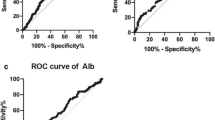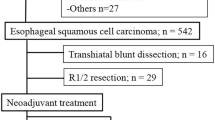Abstract
Background
Inflammation plays a critical role in the development and progression of cancers. We evaluated the clinical significance of the preoperative modified systemic inflammation score (mSIS) to predict long-term outcomes of patients with esophageal squamous cell carcinoma (ESCC).
Methods
We included 443 patients who underwent curative resection of ESCC. The mSIS was formulated according to the serum albumin level (ALB) and lymphocyte-to-monocyte ratio (LMR) as follows: mSIS 0 (ALB ≥ 4.0 g/dL and LMR ≥ 3.4), mSIS 1 (ALB < 4.0 g/dL or LMR < 3.4), and mSIS 2 (ALB < 4.0 g/dL and LMR < 3.4).
Results
Patients were categorized into preoperative mSIS 0 (n = 165), mSIS 1 (n = 183), and mSIS 2 (n = 95) groups. Preoperative mSIS was significantly associated with age, preoperative body mass index, and pathological disease stage. The disease-specific survival times of patients in preoperative mSIS 0, 1, and 2 sequentially shortened (P = 0.009), and mSIS 2 was identified as an independent prognostic factor (hazard ratio 2.63, 95% confidence interval 1.33–5.27, P = 0.0053). In most patient subgroups, the mSIS was associated with greater risk of disease-specific death. A stepwise increase in the prevalence of hematogenous recurrences was directly proportion to the mSIS. When patients were subdivided by mSIS before neoadjuvant treatment, there were no significant differences in disease-specific survival.
Conclusions
Our findings demonstrate that the preoperative mSIS may serve as a powerful prognosticator of ESCC that definitively stratifies clinical outcomes as well as a tool for selecting treatment strategies.




Similar content being viewed by others
References
Siegel RL, Miller KD, Jemal A. Cancer statistics, 2019. CA Cancer J Clin. 2019;69:7–34.
Domper Arnal MJ, Ferrandez Arenas A, Lanas Arbeloa A. Esophageal cancer: Risk factors, screening and endoscopic treatment in Western and Eastern countries. World J Gastroenterol. 2015;21:7933–43.
Huang FL, Yu SJ. Esophageal cancer: Risk factors, genetic association, and treatment. Asian J Surg. 2016.
Lagergren J, Smyth E, Cunningham D, et al. Oesophageal cancer. Lancet. 2017;390:2383–96.
Hong L, Han Y, Zhang H, et al. Prognostic markers in esophageal cancer: from basic research to clinical use. Expert Rev Gastroenterol Hepatol. 2015;9:887–9.
Mantovani A, Allavena P, Sica A, et al. Cancer-related inflammation. Nature. 2008;454:436–44.
Forssell J, Oberg A, Henriksson ML, et al. High macrophage infiltration along the tumor front correlates with improved survival in colon cancer. Clin Cancer Res. 2007;13:1472–9.
Chang Y, An H, Xu L, et al. Systemic inflammation score predicts postoperative prognosis of patients with clear-cell renal cell carcinoma. Br J Cancer. 2015;113:626–33.
Huang L, Liu S, Lei Y, et al. Systemic immune-inflammation index, thymidine phosphorylase and survival of localized gastric cancer patients after curative resection. Oncotarget. 2016;7:44185–93.
Sato B, Kanda M, Tanaka C, et al. Significance of Preoperative Systemic Inflammation Score in Short-Term and Long-Term Outcomes of Patients with Pathological T2-4 Gastric Cancer After Radical Gastrectomy. World J Surg. 2018;42:3277–85.
Lin JX, Lin JP, Xie JW, et al. Prognostic importance of the preoperative modified systemic inflammation score for patients with gastric cancer. Gastric Cancer. 2019;22:403–12.
Ando N, Kato H, Igaki H, et al. A randomized trial comparing postoperative adjuvant chemotherapy with cisplatin and 5-fluorouracil versus preoperative chemotherapy for localized advanced squamous cell carcinoma of the thoracic esophagus (JCOG9907). Ann Surg Oncol. 2012;19:68–74.
Kanda M, Koike M, Tanaka C, et al. Risk Prediction of Postoperative Pneumonia After Subtotal Esophagectomy Based on Preoperative Serum Cholinesterase Concentrations. Ann Surg Oncol. 2019.
Clavien PA, Barkun J, de Oliveira ML, et al. The Clavien-Dindo classification of surgical complications: five-year experience. Ann Surg. 2009;250:187–96.
Zhang D, Zheng Y, Wang Z, et al. Comparison of the 7th and proposed 8th editions of the AJCC/UICC TNM staging system for esophageal squamous cell carcinoma underwent radical surgery. Eur J Surg Oncol. 2017;43:1949–55.
Kanda M, Mizuno A, Tanaka C, et al. Nutritional predictors for postoperative short-term and long-term outcomes of patients with gastric cancer. Medicine (Baltimore). 2016;95:e3781.
Zhang Y, Shi SM, Yang H, et al. Systemic inflammation score predicts survival in patients with intrahepatic cholangiocarcinoma undergoing curative resection. J Cancer. 2019;10:494–503.
Chan JC, Chan DL, Diakos CI, et al. The Lymphocyte-to-Monocyte Ratio is a Superior Predictor of Overall Survival in Comparison to Established Biomarkers of Resectable Colorectal Cancer. Ann Surg. 2017;265:539–46.
Leek RD, Lewis CE, Whitehouse R, et al. Association of macrophage infiltration with angiogenesis and prognosis in invasive breast carcinoma. Cancer Res. 1996;56:4625–9.
Pollard JW. Trophic macrophages in development and disease. Nat Rev Immunol. 2009;9:259–70.
Shibutani M, Maeda K, Nagahara H, et al. The prognostic value of the systemic inflammatory score in patients with unresectable metastatic colorectal cancer. Oncol Lett. 2018;16:666–72.
Liu B, Huang Y, Sun Y, et al. Prognostic value of inflammation-based scores in patients with osteosarcoma. Sci Rep. 2016;6:39862.
Geng Y, Shao Y, Zhu D, et al. Systemic Immune-Inflammation Index Predicts Prognosis of Patients with Esophageal Squamous Cell Carcinoma: A Propensity Score-matched Analysis. Sci Rep. 2016;6:39482.
Inaoka K, Kanda M, Uda H, et al. Clinical utility of the platelet-lymphocyte ratio as a predictor of postoperative complications after radical gastrectomy for clinical T2-4 gastric cancer. World J Gastroenterol. 2017;23:2519–26.
Sasahara M, Kanda M, Ito S, et al. The Preoperative Prognostic Nutritional Index Predicts Short-Term and Long-Term Outcomes of Patients with Stage II/III Gastric Cancer: Analysis of a Multi-Institution Dataset. Dig Surg. 2019:1–10.
Suzuki Y, Okabayashi K, Hasegawa H, et al. Comparison of Preoperative Inflammation-based Prognostic Scores in Patients With Colorectal Cancer. Ann Surg. 2016.
Ryo S, Kanda M, Ito S, et al. The Controlling Nutritional Status Score Serves as a Predictor of Short- and Long-Term Outcomes for Patients with Stage 2 or 3 Gastric Cancer: Analysis of a Multi-institutional Data Set. Ann Surg Oncol. 2019;26:456–64.
Acknowledgment
The authors thank Edanz Group (www.edanzediting.com/ac) for editing a draft of this manuscript.
Funding
None.
Author information
Authors and Affiliations
Corresponding author
Ethics declarations
Disclosure
None.
Additional information
Publisher's Note
Springer Nature remains neutral with regard to jurisdictional claims in published maps and institutional affiliations.
Electronic supplementary material
Below is the link to the electronic supplementary material.
Rights and permissions
About this article
Cite this article
Kanda, M., Koike, M., Tanaka, C. et al. Modified Systemic Inflammation Score is Useful for Risk Stratification After Radical Resection of Squamous Cell Carcinoma of the Esophagus. Ann Surg Oncol 26, 4773–4781 (2019). https://doi.org/10.1245/s10434-019-07914-7
Received:
Published:
Issue Date:
DOI: https://doi.org/10.1245/s10434-019-07914-7




